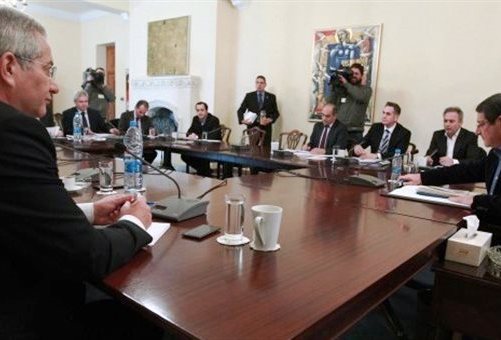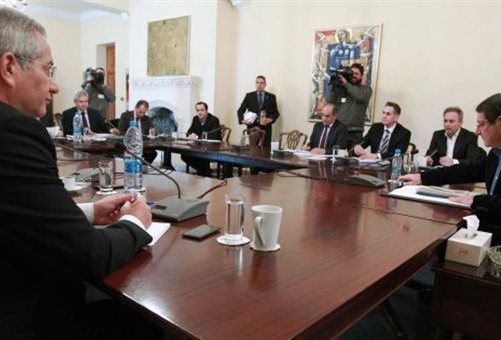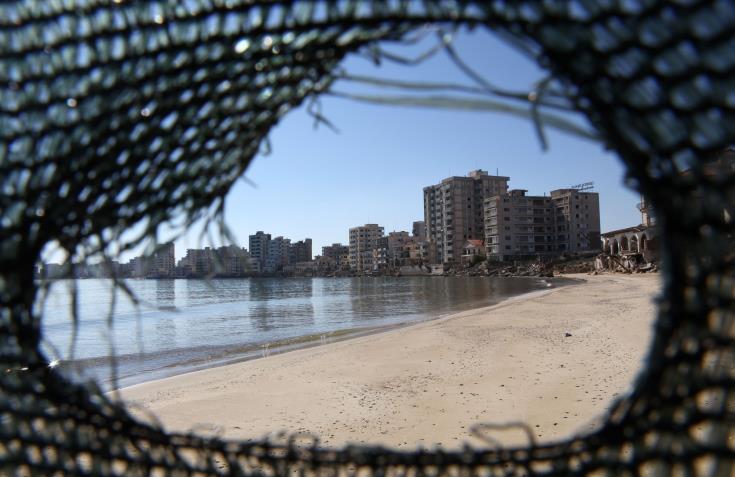
The strategy on the Cyprus Problem was discussed at the National Council Session
Statement by Andros Kyprianou, General Secretary of the C.C. of AKEL
AKEL C.C. Press Office, 20th February 2015, Nicosia
 In the two-day session of the National Council we dealt with the issue of the strategy that must be followed on the Cyprus problem. By strategy, we mean the sought aim, which for AKEL remains the continuity of the Republic of Cyprus and its evolvement into a bi-zonal, bi-communal federation with political equality as defined in relevant resolutions of the United Nations Security Council. In this sense, AKEL considers that no change in strategy is needed. Tactics and the given handling of issues designed to achieve the strategic goal is another matter. Tactics cannot be static and depend on the given specific conditions.
In the two-day session of the National Council we dealt with the issue of the strategy that must be followed on the Cyprus problem. By strategy, we mean the sought aim, which for AKEL remains the continuity of the Republic of Cyprus and its evolvement into a bi-zonal, bi-communal federation with political equality as defined in relevant resolutions of the United Nations Security Council. In this sense, AKEL considers that no change in strategy is needed. Tactics and the given handling of issues designed to achieve the strategic goal is another matter. Tactics cannot be static and depend on the given specific conditions.
We all agree that the Cyprus problem is essentially an international problem of Turkish invasion and occupation; a problem of the violation of the human rights of the Cypriot people as a whole, Greek Cypriots and Turkish Cypriots. However, the Cyprus problem also has an internal aspect, a fact that cannot be overlooked. The compromise of bi-communal bi-zonal federation was accepted not because there was any ignorance of the substance of the Cyprus problem. On the contrary, federation was accepted precisely because there was a complete realisation of the consequences of the coup d’état, invasion and occupation, as well as of the need to create the preconditions for lifting the partitionist faits accomplis. Bi-zonal, bi-communal federation is the compromise which we have accepted as a result of the treasonous coup d’état and the brutal Turkish invasion. It is extremely important that this bitter on the one hand, but nevertheless undeniable historical truth should never escape our attention.
Bi-zonal, bi-communal federation as the sought solution of the Cyprus problem is included in the first High-Level Makarios – Denktash Agreement of 1977. Since then it has been reaffirmed by all the Presidents of the Republic of Cyprus and been adopted by the UN Security Council in its resolutions. It is also our long-standing position, which is enshrined in numerous UN resolutions, as well as in the two Christofias – Talat Joint Communiques, that federal Cyprus will have a single sovereignty, a single citizenship and a single international personality. Finally, political equality, as defined by relevant UN resolutions, has been agreed.
At the session of the National Council AKEL analysed concisely the content of all these concepts which , in our opinion, represent the minimum content of the agreed framework for the solution of the Cyprus problem; one state with a single sovereignty, a single international personality and a single citizenship. A bi-communal, bi-zonal federation with political equality as defined in relevant UN Security Council resolutions. Therefore, if we are really interested in the content, not the label, then we must give an unequivocal reply to the following question: Do we accept this minimum content or not?
Furthermore, is the disengagement from the framework set out by the High-Level Agreements and the resolutions of the UN Security Council and the open or covert pursuit of a unitary state feasible? If this is our conclusion at a time when we are fighting with tooth and nail to prevent the upgrading of the pseudo-state, then we fear that we are being completely unrealistic.
The dilemma set before us by the coup d’état and invasion is between federation and partition. The return to the times of questioning the compromise of a federal solution, no matter how well-intentioned it may be, ultimately leads to the permanent partition of our island.
We have no illusions that if the current crisis is defused and negotiations resume, it will be easy to reach a federal solution. The reason is simple: Turkey is in fact not seeking a federal compromise, but rather confederation or partition. However, do we have any other option but the talks as the means to solve the Cyprus problem? Without talks there cannot be any agreed solution. Without an agreed solution the partitionist status quo will be consolidated every day. Only through talks can we expose Turkey, reveal her real objectives and create conditions for the exertion of pressure on her to abandon her illegal and anachronistic partitionist objectives and accept in practice the compromise of federation.
This is what AKEL means when it strongly insists on the need to stick to the strategy and framework of the solution agreed since 1977. The question is: Can we, after forty years, change strategy? Have the given conditions and balance of forces changed dramatically in our favour and are we thus in a position – without suffering a heavy cost – to successfully attempt to do this?
In our view, no. On the contrary, not only has the situation not changed in our favour, but it is strengthening Turkey’s role in the region. Certainly, Cyprus’ accession to the European Union is a comparative advantage that can and should be used in the efforts to solve the Cyprus problem. However, we must not overestimate the role which the European Union may or would like to play. The expectations that the European Union will insist on a solution based on principles upon which it is based, principles that indeed many circles and forces identify with the desired solution of the Cyprus problem, have not been confirmed by life itself. Unfortunately, the European Union does not always support the principles of the solution as we perceive them, while in many cases it supports or tolerates the Turkish side’s approaches. I will not go too far back in time, but simply recall the tolerance the EU showed with regards the issue of the NAVTEX issued by Turkey, which is flagrantly violating the relevant UN Treaty on the Law of the Sea, that is part of the acquis communautaire.
We often hear that we must create conditions so that Turkey will have a political cost and that we have never followed an assertive policy. We do not disagree that where it is possible we have to do so, trying to serve the goal of the solution, and not the perpetuation of the deadlock. We have no illusions, however. We have not heard any concrete proposals on how we could create such a cost for Turkey while simultaneously creating preconditions for a solution. This is no accident. In today’s world the policy of the major imperialist countries is not the prevalence of International Law but instead their own selfish interests. Whatever we do, it is an illusion to believe that we can be more “useful” to the Western powers than Turkey. This is being demonstrated today for the umpteenth time.
Turkey, illegally designating a part of the Exclusive Economic Zone (EEZ) of the Republic of Cyprus and hindering the work in progress, is exploiting its position of strength and the tolerance shown by her allies, the US and Britain, in the war against the jihadists.
We have on many occasions analysed in public, but also during the Meetings between the Political Leaders and within the framework of the National Council, what in our view should be done so that we do not enter into any adventures on the Cyprus problem, as well as with regards the calamity with the Joint Communique, President Anastasiades’ reckless decision not to continue the talks from the point they were left and the deadlock methodology that was agreed to continue the talks. We hope, even at this stage, all these will make President Anastasiades reflect on his further handling of issues.
What is now the priority is to address the Turkish provocations; to overturn the fait accomplis and resume the negotiation procedure. AKEL believes that the collective tackling of the situation is imperative, by drawing lessons from the path pursued until now, far from petty-political or petty-party considerations and experiences. The situation is critical and joint action is imperative, insofar as this is possible.
As AKEL, we had submitted a proposal after the first Turkish NAVTEX which however was not adopted in time. In the course of events most of its aspects were partially and fragmentarily included in separate proposals of the President. I do not claim that our proposal was the magic wand that would have forced Turkey to end its provocations. It was, however, a comprehensive proposal without violating our “red lines”. It would have convinced at least the international community and we would have avoided the worst Report in decades of the UN Secretary-General. And this occurred, despite the fact that the President of the Republic erroneously accepted to put the issue of natural gas on the negotiating table during their last phase. This proposal was unable to prevent Turkey from issuing the new NAVTEX.
The situation is now critical. For two years now the only thing that has been achieved is the drawing up of the Joint Communique. Substantive talks have not managed even to commence and the negotiation procedure was suspended. While Turkey is more provocative than ever, the UN Secretary-General not only did not find a word to say about this but he remembered the alleged isolation of the Turkish Cypriots as well. Within this gloomy framework, we ended up expressing satisfaction about a resolution which in reality says absolutely nothing. And while all this is happening, instead of reflecting on what should be done some have remembered for the umpteenth time to discuss in general and vague terms about the need for a change in strategy.
In conclusion, I want to stress that no one possesses the absolute truth. I have set out AKEL’s approach, which I think is comprehensive, well-substantiated, principled and at the same time realistic. However we are ready to listen and discuss in detail other proposals, so long as they are based on the agreed framework and serve the goal of the solution.




